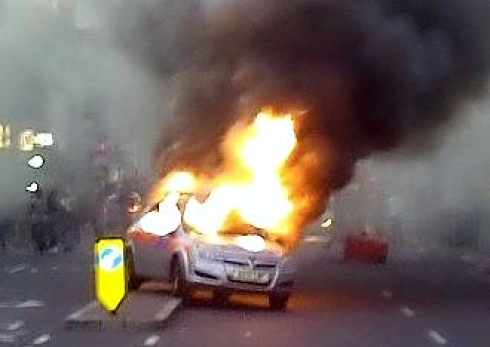 On 5 December The Guardian began to publish the findings of the first phase of ‘Reading the Riots’, a research project jointly undertaken by the newspaper and the London School of Economics, looking into the causes of the August 2011 uprisings in English cities. The research, which is based on interviews with 270 people who participated in the riots in London, Birmingham, Manchester, Salford, Liverpool and Nottingham, gives the absolute lie to the government and its media allies’ repeated insistence for the past four months that the events of 6-10 August were motivated purely by ‘criminality’ and greed, had no political motive and were largely the work of violent gangs.
On 5 December The Guardian began to publish the findings of the first phase of ‘Reading the Riots’, a research project jointly undertaken by the newspaper and the London School of Economics, looking into the causes of the August 2011 uprisings in English cities. The research, which is based on interviews with 270 people who participated in the riots in London, Birmingham, Manchester, Salford, Liverpool and Nottingham, gives the absolute lie to the government and its media allies’ repeated insistence for the past four months that the events of 6-10 August were motivated purely by ‘criminality’ and greed, had no political motive and were largely the work of violent gangs.
Those interviewed by the Reading the Riots research team cited a range of causes for the unrest, including inequality, lack of opportunity and reduced access to education; however the most common complaint was the day-to-day behaviour of the police. 85% of respondents cited policing as an ‘important’ or ‘very important’ factor, with participants sharing repeated stories of wrongful arrest, gratuitous brutality and the endless use of stop-and-search as a form of harassment, particularly of young black men.
“Young people in general cannot walk down the street without the police stopping them,” said a 27-year-old woman from Salford. “[They say]: ‘Take your hat off, take your hood off, what you doing, empty your pockets, there’s four of you, you’ve got to split up, you can’t go round in a group – even when they are not doing anything wrong.”
73% said they had been stopped and searched in the previous 12 months. When this figure was put to former Metropolitan Police Commissioner Ian Blair on Newsnight, he contemptuously responded that the fact that those interviewed had admitted to participating in the riots demonstrated that the police were in fact targeting the correct people.
‘Like many of the men interviewed, women and girls who took part cited a deep-seated mistrust of the police as a motivation for rioting; only 7% thought the police did a good job, mirroring the finding among men we questioned. “We hate them,” said one 16-year-old from north London. “They always want to stop and search us all the time even without no reason. They do it to me every time I walk on the street.” ‘
Many respondents from across the country spoke knowledgeably about deaths in custody, including those of Roger Sylvester and Smiley Culture, and expressed anger at the police killing of Mark Duggan. Again this contradicts the widely reported assumption that participants outside Tottenham were not interested in or did not even know about the death that sparked the riots.
This consciousness comes through in the many eyewitness accounts from participants in the uprisings, in which for every tale of how a shop was trashed and looted, there is a story of how a police car was set on fire, the police were chased out of an area or a police station trashed or burned down and how this was ‘payback’ for years of harrassment:
‘Rioters recounted how they sought revenge against police. Many adopted the language of war … One 29-year-old in London recalled rioting with “a battalion, a squadron, a whole section of men. A troop of men”. ‘Others described how they threw stones and bottles, rammed police with wheelie bins and shouted: “Fuck the police.” Some spoke of how they targeted police property, setting fire to and vandalising cars, vans and police stations, or deliberately tried to inflict injury on officers.’
With the police very clearly the adversary, other animosities were put on hold. Although incidence of ‘gang’ participation has been vastly exaggerated, with even government ministers having to reassess the emphasis they put on it in the immediate aftermath, in so much as gangs were involved, they put their differences on hold in order to fight the common enemy.
‘A handful of respondents said the “unity” – a word cited in dozens of interviews – and perceived collective strength led to improved relations in the week after the riots. In Birmingham, a black rioter said he was more likely to speak to Asian youths since the riots, while in south London there were sightings of rival gang members talking together at the same house party.’
As we wrote in FRFI 224: ‘No matter how much the media continues to depict the events which followed [Mark Duggan’s death] as incoherent and those who took part as mindless, ill-informed, greedy criminals, they were rising up and fighting back against a system in which racism remains prevalent, the gap between rich and poor continues to widen, services are being destroyed and the police are increasingly overt in their brutality. We must continue to oppose the attempts to marginalise and criminalise this resistance.’
Nicki Jameson
All quotes from http://www.guardian.co.uk/uk/series/reading-the-riots
Video: 14 August – 16 police officers smash their way into the flat where 17-year-old Michael Morrison lives with his mother, to arrest him for alleged looting – it was eventually accepted that he took no part in the riots
For further coverage of the August riots see
Uprising in Tottenham
http://www.
Riots and Repression
http://www.
Eyewitness report of the Manchester uprising
http://www.




